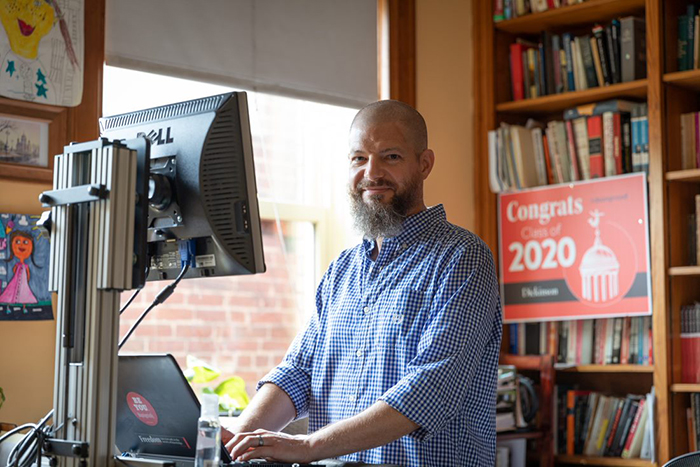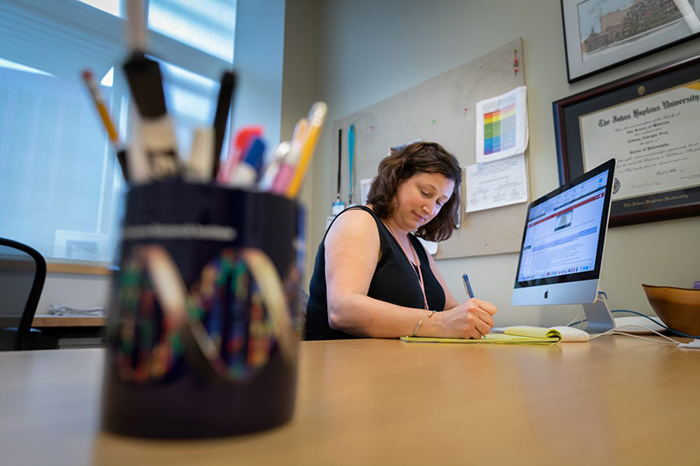Dickinson College Faculty Members Prepare to Bring Benefits of Liberal-Arts Education Online

All summer, faculty members like Karl Qualls have been hard at work learning the tools and strategies to bring the benefits of a liberal arts education online. Photo by Joe O'Neill.
Video by Joe O'Neill
Faculty prep for rigorous and personalized approach to fall online classes
by MaryAlice Bitts-Jackson
It takes a tech-savvy person to present information virtually, and a tech-savvy educator to actually teach it. But Dickinson professors don’t stop there: All summer long they’ve been hard at work, learning tools and sharing ideas to bring Dickinson’s distinctive liberal-arts education online this fall.
They’re taking part in Dickinson’s Ready for Fall (RFF) program, a three-part, summerlong program of online learning sessions and group workshops developed last May by Dickinson faculty and teaching and technology experts and informed by student feedback. The goal: to provide the skills, knowledge and support to help faculty learn up-to-the-minute strategies in online education and then share ideas on how to apply these methods to Dickinson’s educational mission and values.
“Faculty members did a great job learning the technological tools last spring to quickly take courses online. Now, we have the time to build on that experience and learn how to teach online with a liberal-arts inflection,” says Noreen Lape, associate provost and director of the writing program, who chairs the RFF group. “In this way, our delivery of online courses will add something of value beyond the typical online class.”
Collaboration among professors also enriches course material. RFF workshops with professors from different academic departments pave the way for interdisciplinary projects and courses. Departmental workshops help professors discover how best to meet the challenges of teaching online within their disciplines.
So what does this mean for students?
Global, sustainable, active
Now as ever, Dickinson students learn to see the world through global and sustainable lenses and to solve complex problems by making connections between subjects. That’s built into Dickinson classes, whether in person or online. Also critical: Dickinson students apply what they’re learning in class through original research, immersive projects and other active learning experiences. That was true last spring, when Dickinson presented a collegewide online research symposium, and in recent months, when students took part in social-distance-friendly community-based projects and internships. And RFF helps professors take online active learning to the next level.
Tools like small-group breakout-room discussions, forums for posting discussion questions, electronic whiteboards for group projects and quizzes keep students engaged in class. Through RFF, faculty members also explored subject-specific active learning options.
Associate Professor of Spanish Erin Diaz, an RFF group leader, and her foreign-language colleagues will set up small-group conversation-practice sessions with specially trained tutors who’ve worked at Dickinson’s Multilingual Writing Center. Interns working overseas at Dickinson study-abroad centers and through Dickinson partner programs abroad will also join in. Associate Professor of Biology Tiffany Frey, also part of the RFF leadership group, contributed an RFF module on virtual science labs. Using interactive elements, simulations and multimedia, she and her colleagues can ensure that as students learn experimental design and data analysis, they also understand the lab methods and how to apply them in a professional setting. Livestream performances and events for students studying music and theatre & dance are also in the works.
Flexibility and connection
Dickinson’s professors know their students by name and care about their success. Small class sizes and regular office hours help build close student-faculty connections. But what happens when a student doesn’t have the bandwidth to join a synchronous online session, or when other technical issues arise?
Through RFF, professors think deeply about the constellation of circumstances that pose challenges to students, such as shared devices and limited internet access. And then the professors learn how to switch it up when technical snafus arise. This can be as simple as providing different delivery options for assignments, learning multiple online-collaboration tools or even making a phone call to a student who’s unable to attend office hours online.

Associate Professor of Biology Tiffany Frey prepares online-learning classes for the fall semester. Photo by Joe O'Neill.
Fostering connections among students
Fostering online student connections was not a vital skill when the college moved to online instruction last March, since students and professors had already gotten to know each other during the first half of the semester. But it’s essential as professors prepare to teach a new crop of students online this fall.
That’s because, in addition to connections forged through clubs and extracurricular and cocurricular activities, classroom community enhances students’ lives and helps them. At Dickinson, community is also key to learning.
“A class is a mini-community that can explore new ideas and ways of thinking, especially if students feel that they can be vulnerable and safe while exploring those concepts,” says Diaz, who’ll teach upper-level Spanish students and a First-Year Seminar this fall.
Frey agrees. She will record short lectures her students can watch at their leisure, so they can use scheduled class times to connect. “I have learned so much about effective ways to do this through RFF and I feel confident about this approach,” Frey says. “In fact, I hope to use the recorded lectures even after we all return to campus, which will result in more time during class to dig deep into the material.”
Meeting diverse educational needs
Our professors are trained to assess and meet the needs of diverse learners, a mission that becomes more challenging—and, arguably, more vital—when teaching and learning go online. RFF lays out the tools and strategies professors can use to reach all students by presenting material and assessing student understanding in a variety of ways.
RFF participants also learn about cultural and socioeconomic factors that can affect learning. A student without a private place to study may not feel comfortable entering classroom conversations about controversial topics. Those without reliable internet access or who share a tablet or computer may have trouble logging on, and some students may not be able to access specific online resources—such as students in China who cannot access YouTube.
Specialized RFF modules examine the ways that trauma affects learning and cognition. That’s a timely issue when stress is high due to the global pandemic and the causes and effects of social unrest, and when disparities are exacerbated by pandemic-related illness and financial strain.
“I don't think we can even imagine the stress that some of our students are experiencing due to the current state of the world and personal circumstances,” says Frey, who learned about the concept of compassionate curiosity through RFF colleagues Kirk Anderson, associate professor of education, and Rebecca Anderson, staff psychologist.
In all these instances and more, awareness, personalized attention and an action plan make all the difference in students’ experiences. And by bringing professors together to work through these issues, the course supplies a framework of ongoing professional development and peer support.
Full speed ahead!
So while we can’t wait to welcome students back to campus when it’s safe, the RFF helps assure that there’s also much good work to look forward to in the weeks ahead. Dickinson Instructional Design Specialist Melissa Wehler is excited to see the hard work pay off.
“Putting the Dickinson mission at the center of our course design has always set us apart, and in fall, we’ll see that in our digital classrooms as well," says Wehler, who taught online for seven years before joining the Dickinson community and is featured in the "Teaching Difficult Topics" epioside of the Lecture Breakers podcast.
The RFF group’s two student members, Alex Thorsuld ’22 and Kate Erfle ’21, agree. Both provided feedback on their experiences last spring to help Dickinson subject experts to develop the RFF courses.
“The professors in this group seemed so aware and concerned about the well-being and education of their students. Their top priority is making sure that we still learn and get a quality education,” says Erfle, a student-tutor who co-presented an alumni virtual workshop over the summer. “With so much uncertainty, they are truly doing everything they can to create the best learning environment possible and to keep the wonderful Dickinson education and community going strong.”
TAKE THE NEXT STEPS
Published July 20, 2020